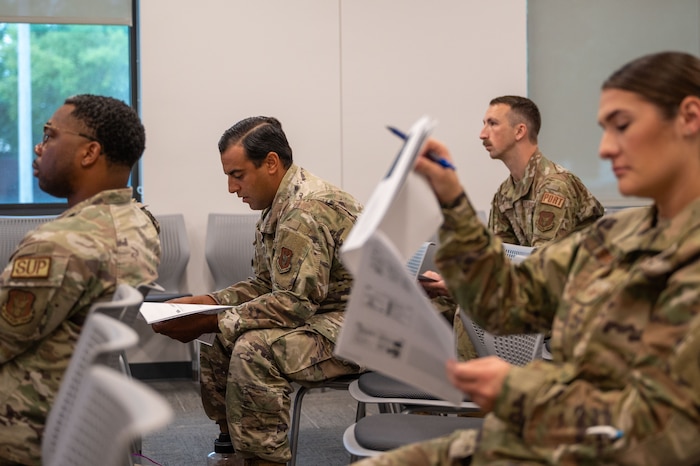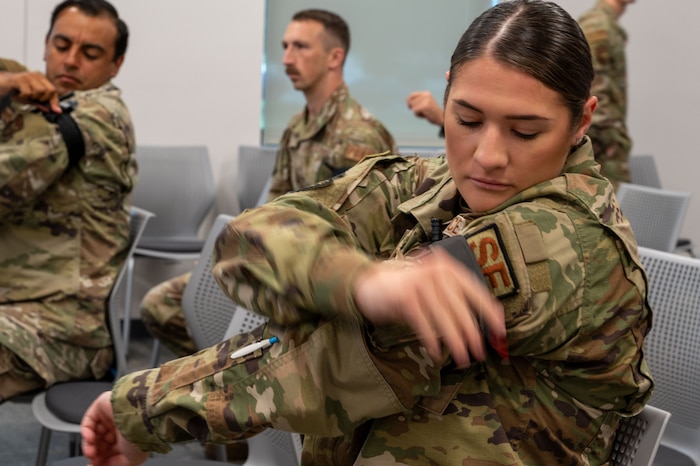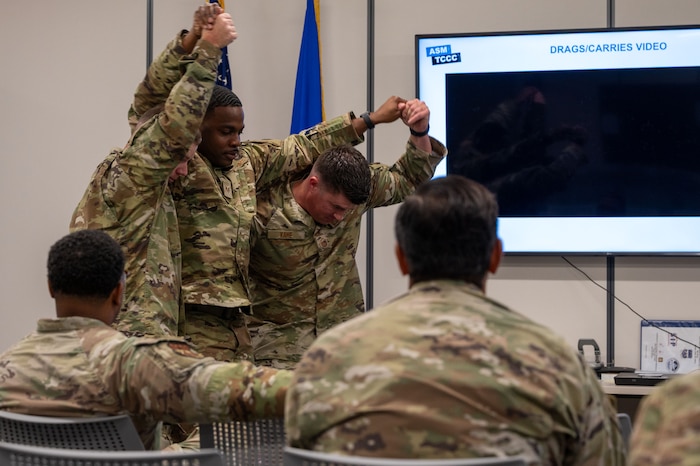KEESLER AIR FORCE BASE, Miss. -- Air Force Reserve Citizen Airmen train to deploy, and in order for a deployed member to be ready for any situation, that training reaches far beyond their Air Force Specialty Code.
One fundamental concept all uniformed members of the Department of Defense are required to understand and be able to perform is Tactical Combat Casualty Care. For most non-medical AFSC’s, personnel are required to take the TCCC Tier 1 All Service Members course which provides the basics for responding to casualties in a high-stress environment. All members are required to complete TCCC once, initially, and again within one year of deploying.
“There are four tiers of TCCC courses, but most of the wing falls under the tier one requirement,” said Master Sgt. Tiesha Baldwin, 403rd Aeromedical Staging Squadron nursing services flight chief. “This course teaches five fundamental lifesaving skills to treat bleeding, airway and respiratory injuries in three phases that include care under fire, tactical field care, and tactical evacuation care.”

403rd Wing members become TCCC instructors
Tech. Sgt. Miguel Rivera-Ainaga, 41st Aerial Port Squadron passenger services supervisor, looks over material as part of his training to become a Tactical Combat Casualty Care Instructor at Keesler Air Force Base, Miss., Sept. 7, 2024. Members can become TCCC instructors by completing an online training course, an in-person TCCC course, and instructing one course under supervision. (U.S. Air Force photo by Tech. Sgt. Kristen Pittman)
1 of 3

403rd Wing members become TCCC instructors
Tech. Sgt. Peri Byrd, 403rd Security Forces Squadron member, practices applying a hasty tourniquet during a Tactical Combat Casualty Care course at Keesler Air Force Base, Miss., Sept. 7, 2024. This was Byrd's second step toward becoming a TCCC instructor. The steps are to complete an online training course, an in-person TCCC course, and to instruct one course under supervision. (U.S. Air Force photo by Tech. Sgt. Kristen Pittman)
2 of 3

403rd Wing members become TCCC instructors
Staff Sgt. Daniel Comer, Staff Sgt. Eric Hampton, and Master Sgt. Dustin Kane demonstrate the two-person supporting carry during a Tactical Combat Casualty Care trainer course at Keesler Air Force Base, Miss., Sept. 7, 2024. Members can become TCCC instructors by completing an online training course, an in-person TCCC, and instructing one course under supervision. (U.S. Air Force photo by Tech. Sgt. Kristen Pittman)
3 of 3
These basic life-saving skills require dedicated and qualified instructors to provide the training to the 403rd Wing’s approximately 1,500 military members and ensure readiness.
“Anybody, regardless of their AFSC, can become an instructor for TCCC ASM,” said Baldwin.
The steps to become an instructor are simple.
First, a member must complete the computer-based training portion on the Deployed Medicine website at https://deployedmedicine.com/. Members should click the “TCCC Train the Trainer Course – Instructor Trainer Collection” link, create a login, and click on “2024 TCCC – ASM – Train the Trainer Online” course.
Following completion of the online course, members must then complete an in-person Train-the-Trainer course before finally instructing a TCCC ASM course under the supervision of Master Sgt. Baldwin or one of the other certified medical provider instructors from the 403rd ASTS.
Tech. Sgt. Peri Byrd, of the 403rd Security Forces Squadron, alongside several other members from across the wing, participated in TCCC instructor qualification over the September Unit Training Assembly and described it as a seamless process.
“On the civilian side I work as a CPR instructor, so it was fun to add to my skills,” said Byrd “I’ve been through the course before as required, but going the instructor route and having to really understand what is being taught and be confident in it so that I can teach other people these skills was a great experience.”
Baldwin said the TCCC program needs more volunteers to be instructors in order to better meet the criteria mandated by the DoD of one instructor for every six students.
“This course is important not only because of the lifesaving skills it provides but also from a deployment readiness perspective,” she said. “We are currently working to complete a schedule for future instructor classes and will ensure those dates are made available to the wing once finalized.”
If interested, personnel can contact Baldwin via e-mail to sign up for the next trainer course.